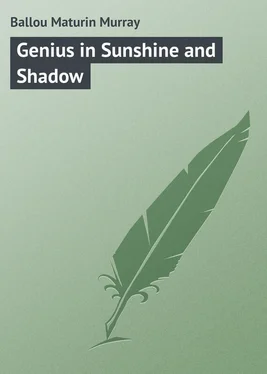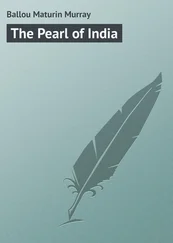Maturin Ballou - Genius in Sunshine and Shadow
Здесь есть возможность читать онлайн «Maturin Ballou - Genius in Sunshine and Shadow» — ознакомительный отрывок электронной книги совершенно бесплатно, а после прочтения отрывка купить полную версию. В некоторых случаях можно слушать аудио, скачать через торрент в формате fb2 и присутствует краткое содержание. Жанр: foreign_prose, foreign_humor, Анекдоты, на английском языке. Описание произведения, (предисловие) а так же отзывы посетителей доступны на портале библиотеки ЛибКат.
- Название:Genius in Sunshine and Shadow
- Автор:
- Жанр:
- Год:неизвестен
- ISBN:нет данных
- Рейтинг книги:4 / 5. Голосов: 1
-
Избранное:Добавить в избранное
- Отзывы:
-
Ваша оценка:
- 80
- 1
- 2
- 3
- 4
- 5
Genius in Sunshine and Shadow: краткое содержание, описание и аннотация
Предлагаем к чтению аннотацию, описание, краткое содержание или предисловие (зависит от того, что написал сам автор книги «Genius in Sunshine and Shadow»). Если вы не нашли необходимую информацию о книге — напишите в комментариях, мы постараемся отыскать её.
Genius in Sunshine and Shadow — читать онлайн ознакомительный отрывок
Ниже представлен текст книги, разбитый по страницам. Система сохранения места последней прочитанной страницы, позволяет с удобством читать онлайн бесплатно книгу «Genius in Sunshine and Shadow», без необходимости каждый раз заново искать на чём Вы остановились. Поставьте закладку, и сможете в любой момент перейти на страницу, на которой закончили чтение.
Интервал:
Закладка:
Enthusiasm is the heritage of youth; it plans with audacity and executes with vigor: "It is the leaping lightning," according to Emerson, "not to be measured by the horse-power of the understanding." In the accomplishment of great deeds it is undoubtedly the keenest spur, and consequently those who have become eminent in the history of the world have mostly achieved their greatness before gray hairs have woven themselves about their brows. Unless the tree has borne ample blossoms in the spring, we shall look in vain for a generous crop in the fall. Notwithstanding the abundance of axioms as to youth and rashness dwelling together, we have ample evidence that it is the period of deeds, when the senses are unworn and the whole man is in the vigor of strength and earnestness. Goethe tells us that the destiny of any nation depends upon the opinions of its young men. Let us recall a few examples, in corroboration of this view, among those who have made their mark upon the times in which they lived.
Alexander the Great reigned over the Macedonians at sixteen; Scipio was but twenty-nine at the zenith of his military glory; Charles XII. 30 30 Charles XII. put his whole soul into the cause of Sweden at the time when she was threatened with extinction by her enemies. He fought all Europe, – Danes, Russians, Poles, Germans, – and gave away a kingdom before he was twenty. At his coronation at Upsala, he snatched the crown from the hands of the archbishop and set it proudly on his head with his own hands.
was only nineteen when, as commander-in-chief, he won the famous battle of Narva; Condé was twenty-two when he gained the battle of Rocroi; Scipio the Younger conquered Carthage at thirty-six, and Cortes subdued Mexico at the same age. At thirty Charlemagne was master of France and Germany; at thirty-two Clive had established the British power in India. Hannibal won his greatest victories before he was thirty, and Napoleon was but twenty-seven when he outgeneralled the veteran marshals of Austria on the plains of Italy. George Washington won his first battle as a colonel at twenty-two; Lafayette was a major-general in our army at the age of twenty. Nor are we to look only for youthful greatness among those who have won laurels in war. William Pitt was prime minister of England at twenty-four; Calhoun had achieved national greatness before he was thirty; while the names of John Adams, Alexander Hamilton, and the elder Pitt in England also suggest themselves in this connection. 31 31 Whipple speaks of three characters "who seem to have been statesmen from the nursery." These were: "Octavius Cæsar, more successful in the arts of policy than even the great Julius, never guilty of youthful indiscretion, or, we are sorry to say, of youthful virtue; Maurice of Saxony, the preserver of the Reformed religion in Germany, in that memorable contest in which his youthful sagacity proved more than a match for the veteran craft of Charles V.; and the second William of Orange, the preserver of the liberties of Europe against the ambition of Louis XIV., who, as a child, may be said to have prattled treaties and lisped despatches."
Handel composed sonatas at ten years of age; Mozart was equally precocious, and died at thirty-six, at which age Shakespeare had written "Hamlet." Bellini, the composer, had produced "II Pirata," "La Sonnambula," and "La Norma," before his thirtieth year; "I Puritani" was finished at thirty, and he died two years later. Charles Matthews the elder began to write for the press at fourteen, and Moore wrote verses for print at the same age; undoubtedly both were open to cool and judicious criticism. 32 32 Nothing is so beneficial to a young author as the advice of a man whose judgment stands constitutionally at the freezing point. — Douglas Jerrold.
Henry Kirke White published a volume of poems at seventeen. Bryant, the first American poet of celebrity, began to write verses at the age of ten, and his most celebrated poem, "Thanatopsis," was written before he was twenty. Fitz-Greene Halleck, author of "Marco Bozzaris," wrote verses for the magazines at fourteen. Congreve was at the height of his literary fame at four-and-twenty, – he to whom Dryden said Shakespeare had bequeathed his poetical crown, and to whom Pope dedicated his version of the Iliad. Watt invented the steam-engine before he was thirty. The reproof administered by his grandmother for his idleness in taking off and replacing the cover of the teakettle, and "playing with the steam to no purpose," will occur to the reader. Joan of Arc 33 33 The life of Jeanne d'Arc is like a legend in the midst of history. — Waller.
was but eighteen when she raised the siege of Orléans and conquered city after city, until Charles VII. was crowned king at Rheims.
Guizot, the distinguished French statesman and historian, seems to have been "a child who had no childhood." At eleven years of age he was able to read in their respective languages Thucydides, Demosthenes, Dante, Schiller, Gibbon, and Shakespeare.
Robert Hall, the eloquent English clergyman, was a remarkable instance of early mental development. It is said that before he was ten years of age he perused with interest and understanding Edwards's treatises on the "Affections" and on the "Will." His sermons, essays, and writings generally were eagerly read and admired by the public; but excessive application at last brought on insanity. It was gracefully said of him that his imperial fancy laid all nature under tribute. Even in madness he did not lose his power of retort. A hypocritical condoler visited him in the mad-house, and asked in a servile tone: "Pray, what brought you here, Mr. Hall?" Hall touched his brow significantly with his finger, and replied, "What'll never bring you, sir, – too much brains!" 34 34 After a couple of years Hall was restored to the full possession of his faculties, and for twenty years thereafter maintained his high reputation as a pulpit orator. He died in 1831.
Macaulay had already won an exalted reputation for prose and poetry before he was twenty-three, and N. P. Willis, before he left college, had achieved enduring fame by his sacred poems, 35 35 Fifty years after these poems were published, as we are informed by the publishers, there is a steady demand for from two to three hundred copies annually. Of how many American books, of a similar character, can this be said?
which, in fact, he never afterwards excelled in a long and successful literary career. Schiller wrote and published in his fourteenth year a poem on Moses. Klopstock began his "Messiah" at seventeen, and Tasso had produced his "Rinaldo," and completed the first three cantos of "Jerusalem Delivered," before he was nineteen. Milton was an unremitting student at ten. Southey began to write verses before he was eleven, Chaucer and Cowley at twelve, and Leigh Hunt at about the same age. Pope, 36 36 I wrote things, I'm ashamed to say how soon. Part of an epic poem when about twelve. The scene of it lay at Rhodes and some of the neighboring islands; and the poem opened under water, with a description of the Court of Neptune. — Pope.
like so many others, began to write poetry as a child, thus proving that "poets are born and not made." Chatterton, the remarkable literary prodigy, died at eighteen, but not until he had established a lasting reputation. Bulwer-Lytton was a successful author at about the same age, and so were Keats and Bayard Taylor. Dickens produced the "Pickwick Papers" before he was twenty-five, and it may safely be said that in wit, humor, and originality he never surpassed that delicious book. These seem interesting facts to remember, though they do not establish any actual criterion, since the thoughtful student of the past can adduce many notable examples of mature development in art and literature.
Интервал:
Закладка:
Похожие книги на «Genius in Sunshine and Shadow»
Представляем Вашему вниманию похожие книги на «Genius in Sunshine and Shadow» списком для выбора. Мы отобрали схожую по названию и смыслу литературу в надежде предоставить читателям больше вариантов отыскать новые, интересные, ещё непрочитанные произведения.
Обсуждение, отзывы о книге «Genius in Sunshine and Shadow» и просто собственные мнения читателей. Оставьте ваши комментарии, напишите, что Вы думаете о произведении, его смысле или главных героях. Укажите что конкретно понравилось, а что нет, и почему Вы так считаете.












